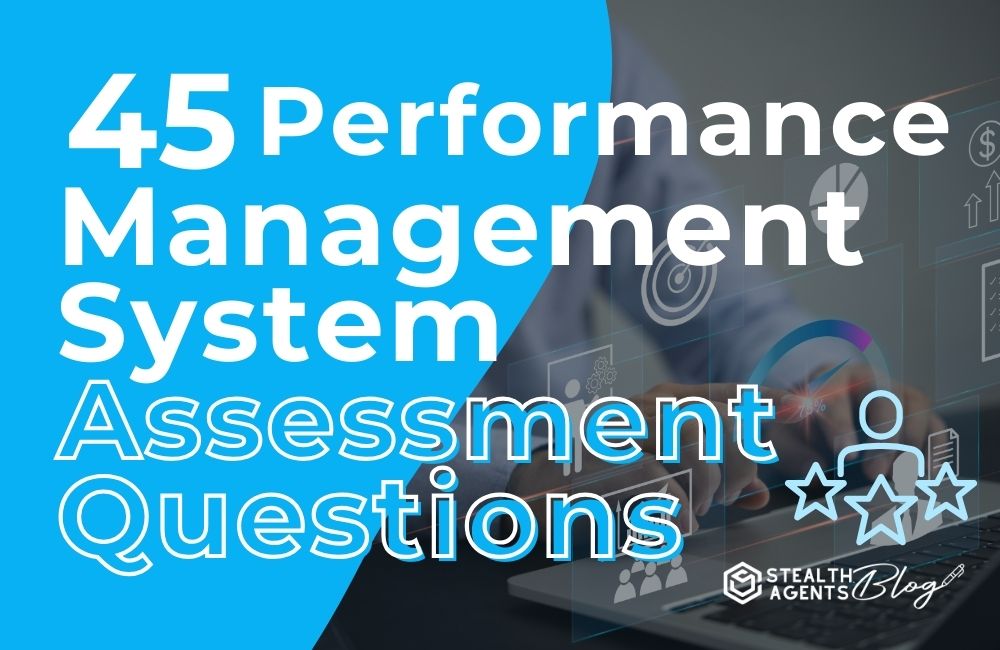Company’s performance management system is the backbone of ensuring coherent development and execution of your organization’s goals. By evaluating the efficacy of your performance management, you can identify strengths and areas that need improvement.
In this listicle, we delve into 45 crucial questions that will guide you through a comprehensive assessment of your performance management system. Engaging these inquiries can help in recognizing what works, what could be better, and how you can facilitate a positive impact on employee morale and performance.
The Essence of Performance Management
Before we dive into the detailed assessment, let’s underscore the pathway to a productive workforce. A vibrant performance management system embodies clear goals, constructive feedback, regular communication, and fair appraisal processes. It’s not just a means to measure output; rather, it’s an instrument of growth and engagement.
Think of it as the cornerstone of your Human Resources strategy. With this understanding, let’s embark upon the examination of your system through 45 insightful questions.
Performance Management System Assessment Questions
Section 1: Formal Processes and Documentation
1. Do We Have Established Performance Management Processes in Place?
Reflect on your current setup. Have you defined step-by-step guidelines and timelines for every aspect of performance management?
2. Are Our Processes Transparent and Well-Communicated?
Is the procedure clear to all staff, from entry-level to managerial positions? Transparency is key for trust and buy-in from all levels of the organization.
3. How Do We Handle Documentation and Record-Keeping?
Consider how you preserve performance data. Is it systematic, secure, and accessible when required?
4. Is There a Regular Cycle for Performance Review and Feedback?
Do you adhere to a consistent cadence for appraisals and review sessions? Regular meetings can enhance the system’s effectiveness.
5. Are We Able to Track Employee Performance Progress Efficiently?
Assess the ease of tracking and monitoring individual performances. This can be significant in identifying trends and supporting employees who may need more guidance.
Section 2: Goal-Setting and Alignment
6. Are Employee Goals Linked to the Company’s Strategic Objectives?
Do individual goals contribute to the ‘bigger picture’ of company success? A clear alignment is pivotal for a robust performance management system.
7. How Clear and Measurable Are the Assigned Goals?
Can employees define success for their goals in tangible terms? Clarity is essential for understanding and motivation.
8. Do We Encourage Agile Goal Management?
Are there provisions to adjust goals as business needs and employee roles evolve? Flexibility can lead to more realistic and attainable objectives.
9. How Often Do We Revisit and Update Employee Goals?
Regular check-ins ensure that goals remain relevant and that progress does not deviate from the organizational direction.
10. Are Reward Systems Tied to Achievement of Agreed-Upon Goals?
Are there incentives and recognition programs that directly relate to goal attainment? This can validate the pursuit for excellence.
Section 3: Feedback Loop and Communication
11. How Open and Constructive Is Our Feedback Culture?
Assess the environment to see if feedback is freely given and received, and if it is useful for personal and professional development.
12. Do We Train Our Managers and Employees in Feedback Skills?
Determine if there’s a structured program in place to enhance the feedback skills of all staff members, especially managers.
13. Is There a System for 360-Degree Feedback?
Explore if you offer a well-defined process where feedback comes from all directions — peers, subordinates, and managers — to provide a holistic view.
14. How Do We Use Feedback for Performance Improvement?
Examine how your organization implements changes based on the feedback received. It should be a catalyst for improvement, not a box to tick.
15. Is There a Platform for Continuous Feedback?
Consider if you have a digital or an analog setup that allows for immediate, ongoing feedback, aligning with the pace of business.
Section 4: Performance Evaluation Criteria
16. Are Our Evaluation Metrics Objective and Clear?
Review the criteria used for appraisal. It’s imperative that they’re understood and accepted as fair and accurate by all parties.
17. How Do We Handle Quality and Quantity of Work Assessment?
Assess how you manage the balance between productivity and the delivery of high-quality work.
18. Are KPIs Aligned with Company Core Values and Employee Development Needs?
Do the metrics focus on both organizational values and individual growth imperatives? The best KPIs reflect this dual perspective.
19. How Do We Factor In External and Internal Contexts Affecting Performance?
Consideration of market conditions, personal circumstances, and job role complexity can lend context to performance assessments.
20. Are There Standardized Tools for Performance Evaluation?
Do you have robust tools (balanced scorecards, 9-box matrix, etc.) that ensure consistency in appraisals across teams and departments?
Section 5: Professional Development and Growth
21. Is There a Formal Professional Development Plan for Every Employee?
Evaluate the standard of having a strategic roadmap to enable employee growth and readiness for future responsibilities.
22. How Flexible Are Development Opportunities to Individual Employee Needs?
Explore if your system allows for tailored development plans catering to diverse learning styles and career aspirations.
23. Are Employees Actively Engaged in Their Personal Growth and Training?
Assess the extent to which staff are proactive and enthusiastic about enhancing their skills and knowledge.
24. How Do We Support Ongoing Learning in the Workflow?
Determine the resources and time available for employees to learn and grow while performing their regular duties.
25. What’s the ROI on Our Professional Development Investments?
Scrutinize the return on investment for initiatives aimed at improving employee knowledge and skills.
Section 6: Performance-Related Compensation and Benefits
26. Are Our Compensation Models Transparent and Clearly Tied to Performance?
Survey the clarity and link between pay scales, bonuses, and financial incentives to individual as well as team performances.
27. How Do We Address Equity and Fairness in Compensation Decisions?
Explore how you handle the disparity in incentive distributions, ensuring they are fair and well-justified.
28. What Frequency and Extent Do We Review and Adjust Compensation and Benefits?
Consider the regularity and thoughtfulness of your compensation reviews, keeping them up-to-date and competitive.
29. Do We Offer Non-Monetary Rewards for Exceptional Performances?
Discuss the variety and relevance of non-financial rewards to appreciate and motivate high performers.
30. How Do We Communicate and Celebrate Individual and Team Achievements in Compensation Context?
Assess your communication strategies for recognizing success within the compensation framework, ensuring public acknowledgment and celebration.
Section 7: Legal Compliance and Ethical Practices
31. Are Our Management Systems Adaptive to Shifting Legal Regulations?
Analyze the agility of your system in response to new HR-related laws or policy changes.
32. How Do We Ensure Privacy and Confidentiality in Performance Data Management?
Review your practices to safeguard employee privacy, maintaining trust and legal compliance simultaneously.
33. Do We Promote Fairness and Inclusion in Performance Assessments?
Examine the procedures aimed at eliminating biases and promoting a culturally sensitive performance evaluation environment.
34. How Transparent Are We in the Reasons Behind Performance Decisions?
Check if you communicate the rationale behind performance-related decisions in an objective and straightforward manner.
35. Are We Prepared and Training Staff in Legal Defense for Performance Management Decisions?
Explore the techniques to prepare your team to defend or justify decisions in case of legal scrutiny.
Section 8: Management Readiness and Competency
36. How Prepared Are Our Managers to Deal with Performance Issues?
Assess the level of training and confidence that managers have in addressing underperformance and recognizing excellence.
37. Are Our Managers Effective Coaches for Their Teams?
Evaluate the success of your managers in nurturing their teams’ professional development through coaching and mentoring.
38. How Do We Foster a Supportive Manager-Employee Relationship for Performance Management?
Explore the initiatives in place to encourage a trusting and supportive environment that optimizes the performance management process.
39. Do We Encourage and Promote Regular One-On-One Manager-Employee Meetings?
Assess the frequency and quality of individual interactions between managers and their reportees for ongoing performance discussions.
40. Are Our Managers Incentivized for Building High-Performing Teams?
Consider if your reward structure recognizes and encourages managers who consistently develop and lead successful teams.
Section 9: Technology and Systems Integration
41. How Do We Measure the Effectiveness of Performance Management Technologies?
Evaluate the metrics used to assess the performance of the tools and software used in performance management.
42. Are Our Tools and Systems User-Friendly and Accessible?
Assess the ease of use and the ability for all staff to engage with the technology, ensuring that it does not become a barrier to effective performance management.
43. How Innovative Are We in Adopting New HR Technologies for Performance Management?
Explore the willingness and agility to adopt and adapt to new technologies that enhance the performance management system.
44. Do Our Systems Integrate Seamlessly with Other HR Platforms for a Holistic Employee View?
Consider the degree to which your performance management systems align with other HR platforms to provide a comprehensive employee perspective.
45. How Do We Ensure Data Accuracy and Security with Our Performance Management Technologies?
Safety and accuracy of data play a crucial role in the reliability of your system. Assess the measures in place to maintain the integrity and privacy of performance-related information.
Enriching Your Performance Management Through Evaluation
A comprehensive self-evaluation with these 45 questions will not only refine your performance management system but also demonstrate your commitment to ongoing employee growth and satisfaction. Use this list as a launchpad for discussions, action plans, and achieving higher levels of performance throughout your organization. Remember, a well-structured performance management system can be a transformative driver for organizational success.









